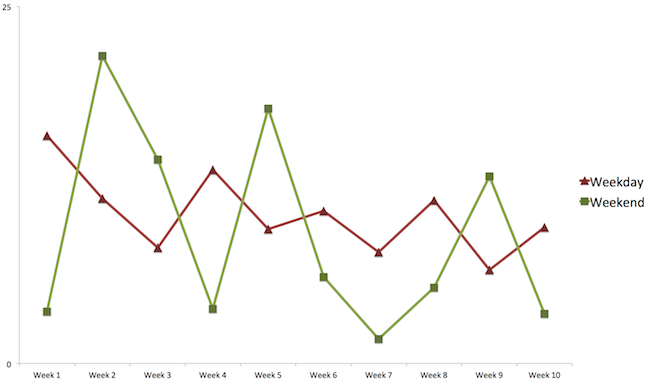Flush with time and surfing leisurely for insight, surely these kinds of website visitors convert at a higher rate. Erm, no. Not really (with asterisks).
NOTE: The content analytics series explores the intersection of content marketing and web analytics in a fun, experimental and hopefully insightful way. Each post in the series will include a hypothesis, and attempt to test that hypothesis, then analyze the results.
Our first hypothesis: A higher proportion of visitors to our content marketing website will convert (fill out a form to download an eBook or other content) over the weekend than during the week.
Process
We selected ten random 7-day periods and compared the proportions of absolute unique visitors to convert (download one of our two form-gated eBooks) for the two weekend days versus the five weekdays. We believed that a higher proportion of the total visitor mass would convert at the weekend, than the same figure for a weekday.
This hypothesis was based on a supposition that most people coming to our website know what kind of site it is, and that – since it is the weekend – they have more time and inclination to engage with larger, chunkier bits of content (than, for example, a simple blog post).
If the hypothesis is true, there’s a good case for increasing activities to drive website traffic during the weekend (weekend blog posting, roundups, etc.).
We would also attempted to ascertain whether the uplift (or downscaling) of conversion during the weekend was statistically significant. In other words, do the numbers really tell us what we are hoping they’ll tell us?
The 7-day periods
The 10 seven-day periods were created by going to random.org and asking it to provide ten random, unique integers from a series from one to 365. Each number then correlates to the last day of a seven-day period, and – using timeanddate.com’s date calendar – we could count back from the date of the study: 12 June 2012.
This gave 12 – 18 July, 16 – 22 August, 7 – 13 September, 30 – 6 October, 3 – 9 December and 18 – 24 December in 2011, and 13 – 19 January, 2 – 8 April, 2 – 8 May and 19 – 25 May in 2012.
For each seven-day period, we split out the five weekdays and the two weekend days. Total unique visits were tallied for each period, then divided by goal conversions (download of one of the two gated pieces of thought leadership on our site: The Content Marketing Workbook, or The B2B Marketing Manifesto). The result is a goal conversion per website traffic. If our hypothesis is correct, this result will be higher for the weekend periods than for weekday periods before and after.
By comparing the weekend days against the weekdays immediately proximate, we minimize how new content on the site may have influenced traffic. And by selecting week-long periods at random, we hopefully get a representative sample.
The data
Weekend conversion rate Weekday conversion rate
Week 1 3.63% 15.96%
Week 2 21.56% 11.55%
Week 3 14.28% 8.12%
Week 4 3.84% 13.59%
Week 5 17.85% 9.43%
Week 6 6.06% 10.7%
Week 7 1.72% 7.8%
Week 8 5.33% 11.42%
Week 9 13.11% 6.56%
Week 10 3.5% 9.54%
Graphed out, the picture isn’t really that much clearer:

In fact, since these weeks are plotted out in chronological order left to right, the only thing that jumps out at you is a trend of steadily decreasing conversion rates (guys, man the eBook pumps!!).
Quickly, we can conclude that the relative paucity of weekend traffic leads to significant variations when only a handful of people do or do not decide to convert. That is, when few people visit the site, only a couple downloads can radically impact the conversion rate. If we total all of the numbers for weekday conversions and weekend conversions, we will hopefully arrive at an aggregated total that is sizeable enough to be more indicative.
The totals
Average weekday conversion rate: 10.40%
Average weekend conversion rate: 8.76%
Results
At first blush, it looks like our study’s results are inconclusive. The conversion rate can vary wildly from weekend to weekend. On the whole, however, no conclusion is a conclusion. Our hypothesis has at the very least NOT been corroborated by the evidence. In other words,
This study definitely did not support an argument that our site converts better at the weekend than on weekdays.
It doesn’t necessarily refute it, either. A larger study might do that.
Conclusion
If the study had supported our hypothesis, we would have a good case for boosting our activity around weekends. While the results were not conclusive, they were indicative enough for us to choose not to prioritize efforts that boost our weekend traffic.

Enjoyed this article?
Take part in the discussion








Comments
There are no comments yet for this post. Why not be the first?